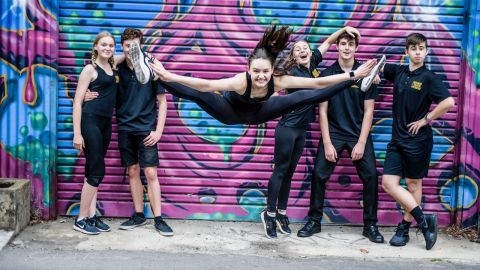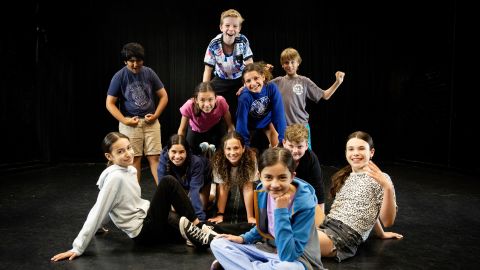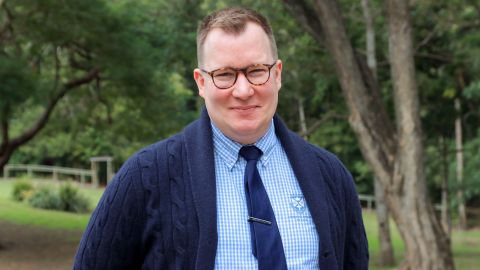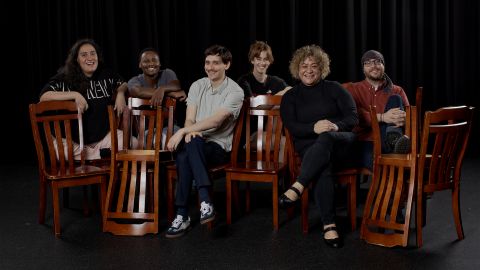Courses Adapt in Horror Year
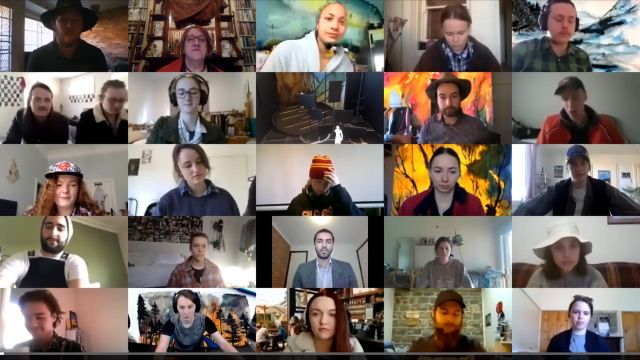
They’ve had dancing lessons from teachers zoomed in from New York, reinvented classic radio plays, created a digital drama festival, chatted to interstate playwrights during rehearsal and even helped remote band members play in sync. David Spicer spoke to leading academics across Australia about the disappointments and triumphs of 2020.
Associate Professor Kim Durban - Program Coordinator, Bachelor of Performing Arts, Federation University Arts Academy.
“I am rehearsing an Australian play about bushfire called Embers by Campion Decent. The live component of rehearsal has moved online (pictured above). We experienced some problems with technology, but overall it has been amazing. I focussed on similar activities to those I always do at the commencement of a play, especially text analysis and character work. This has worked well, with the set designer adding visual images for us to feed from. The actors are also developing and refining their skills.
“The capacity to collaborate across distance (has meant) the playwright was able to visit rehearsals with a key stroke, even though he lives in Sydney. The capacity to speak and work online and get simultaneous chat streams going has deepened our skill to reflect and capture everyone's ideas.”
Associate Professor Rick Chew - Director, Federation University Arts Academy
“Our production courses have been postponed until we are able to transition back to on-campus study. Other students are developing in terms of self-directed study and resilience. In moving online, we’ve also created a wonderful library of music theatre backing tracks, which will be an invaluable teaching tool for years to come.”
Liz Hughes - CEO of NIDA.
“Our full-time performing arts students are being taught online and we now deliver our creative short courses for the public Australia-wide via Zoom.
“The silver lining of the COVID-19 pandemic - in terms of events, our June season of student productions has been reimagined as a Digital Festival for presentation in August. Six inspirational artists will lead never-seen-before online storytelling projects.
“Another significant online initiative is the hosting of In Conversation talks with industry leaders such as Joel Edgerton, Kate Mulvany, Shannon Murphy and Peter Sellars. Recordings of the talks are available at https://www.nida.edu.au/productions/in-conversation.
“The downside of the pandemic for NIDA as a not-for-profit has been financial. NIDA generates a large amount of its own revenue – in 2020, we expected to self-generate 67% of our operating budget. From mid-March, much of our revenue from the delivery of our face-to-face short courses and our venue hire halted.”
Tyran Parke – Head of Music Theatre, Victorian College of the Arts.
“We have encouraged students to approach this period as the artists they want to be in their lives. Artists always have ‘one foot in the unknown’ so we are using it as a time to exercise the muscle that is ‘courage’.
“The biggest changes have been in breaking down our borders to national and international practitioners. I figure, if I can teach the students from home, then so can the best practitioners in the world!
“We capitalised on our international connections to engage an entire staff of teachers, all people of colour, all working on Broadway or the West End. Weekly classes have included Argentinian Tango, Rap, Hip Hop, Gospel, Mambo etc. It has been a remarkable addition to our program.
“In addition, our wonderful donors started an ‘American Songbook in Isolation’ competition that connected our graduates and students, and which was ultimately judged and presented by the remarkable, Michael Feinstein. None of this would have been done, if it were not for Covid 19.”
Travis Jenkins - Jazz Music Institute.
“The lockdown inhibited our ability to engage musically with one another with a full connectedness to 'the moment'.
“Just as one loses the luxury of body language when speaking over the phone, or vocal inflection when by text, without being able to be play music in the same room, or at the same time, the conversation becomes like a letter, or an email, and the interplay loses its immediacy.
“After searching even the sketchiest nether-realms of the internet for capable software that does more than just claim to be able to minimalize internet lag, the depressing reality is that even if these programs, occasionally, perform as well as they claim, we are still doomed by the calamity that is the NBN.
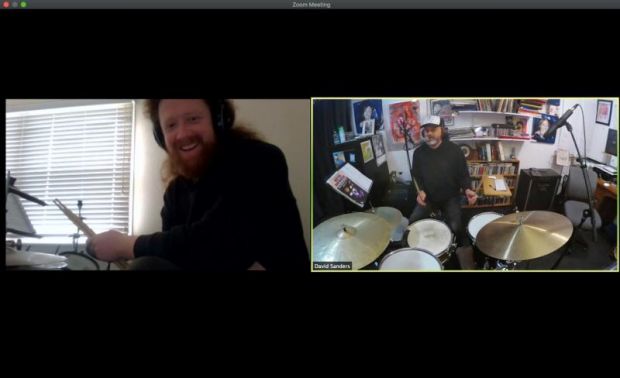
“When performance classes were postponed, I managed to convert much of the learning outcomes to having more of a 'studio performance' focus and practiced repertoire by using a browser called ‘Bandlab’.
“Each musician workshops the arrangement of their chosen repertoire in Bandlab before confirming their full, unedited live takes and recording to be mixed by myself. They each then received a backing track with their part muted, to be performed as their final "Ensemble" recital.
“Since restrictions have eased, most things have been able to happen on campus. Having been thrust into a more technologically involved experience, I have realised that a lot of content can be delivered quite quickly and effectively online. This was enlightening for future course design/curriculum.
Image: Dave Sanders delivers a drum class on Zoom.
David King - Head of Music Theatre at WAAPA.
“We’ve had to cancel productions and move as much teaching as possible online. It’s disappointing for the students but, on the whole, they’ve given it a good go. Their understanding of technology has been a great help.
“The audition process will (also) largely happen online. With 400 plus applicants it is a huge effort of organisation.
“(The pandemic) forced us to develop a greater understanding of technology and its possible uses for teaching. I have been excited to see the amount of creative work happening because of people’s isolation, and to be reminded, if we needed to be, of the astonishing amount of talent Australia has. The response of the ‘Scomo’ government to the arts community has been deeply insulting, but not exactly surprising.”
Professor Paul Sabey – Griffith University.
“We made our acting students (perform) in-house and cancelled our main show in August. Fortunately, third musical theatre students commenced in January and we got a full season of the Elegies Song Cycle on in March.
“The hardest thing for final year students is graduating into a business that they don’t see. We know it will recover stronger.
“Going online is challenging but rewarding. Students say how much they have grown in their own time at home. I miss the ability to work with someone in the rehearsal room where students can show their personality off – some of that can disappear on-line. (Stage) actors also require applause.
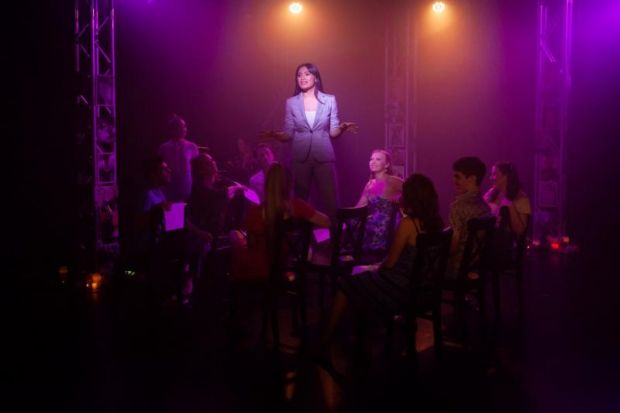
“Instead of students flying down to Sydney or Melbourne, we have brought the industry to them. People like Lucy Durack and Michael Cassell have spoken to them. Many have said that students are in the best place, still training. They are not sitting at home waiting for the world to recover.”
Image: Elegies
Dean Carey - Actors Centre Australia.
“We had to cancel all our public courses and taught students on-line in the first trimester. 4th year students have had their course extended until December. Staff and students have been extremely productive and achieved so much whilst online. Their creativity and flexibility is of the highest order.
“(However) I, like so many, am extremely concerned about the industry and about its members. Social distancing will remain until a vaccine is found. How will smaller theatres survive with drastically reduced capacities? Griffin? Belvoir? Old Fitz? Hayes? Eternity? Full houses may well be a thing of the past for a long, long time to come. Online will never replace LIVE. Artists have adapted and taken to the online platform but how long can that last and how long will audiences remain viewing online?”
Kim MacKenzie - Central Queensland University.
“Term 1 was converted to fully online delivery, with students engaging through Zoom tutorials in all their practical and theoretical classes. This included dance, singing, acting and technical theatre studies. Students and lecturers alike embraced new and innovative ways to further the performing arts training of students. Term 2 will see a return to face to face teaching.
“One of the big positives to come out of this has been that students have had more time to devote to their studies and have been more creative in devising work that suits the medium of online performance.
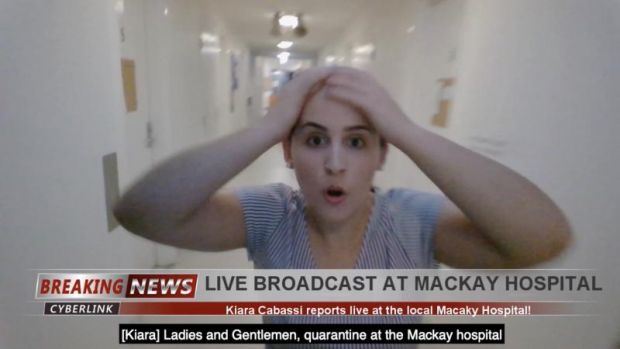
“The Term 1 main stage production was shifted totally online. Under the direction of independent filmmaker Akos Armont, the Bachelor of Theatre students livestreamed an online, immersive production over three consecutive evenings in June
“After grappling with Orson Welles’ famous radio play The War of the Worlds, the team has created an original, innovative work, War in our World, in response to COVID-19. It was livestreamed through the CQCM Facebook page.https://www.facebook.com/events/905415616550175/
Image: Kiara Cabassi.

